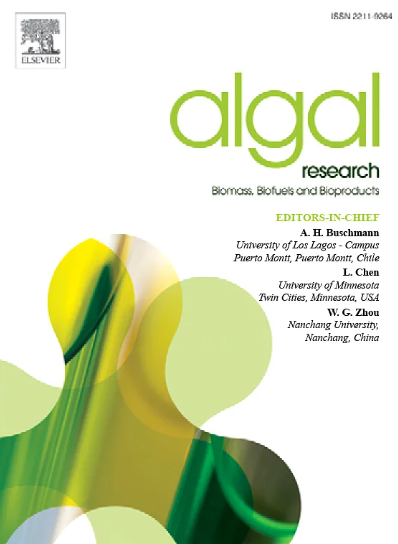Worldwide distribution, current trends and scientific progress in Spirulina research (1967–2024): A Scientometric analysis
IF 4.6
2区 生物学
Q1 BIOTECHNOLOGY & APPLIED MICROBIOLOGY
Algal Research-Biomass Biofuels and Bioproducts
Pub Date : 2025-04-07
DOI:10.1016/j.algal.2025.104029
引用次数: 0
Abstract
Spirulina is a promising functional food with versatile applications in the environment, animal feed, cosmetics, biofuel production, agriculture, biotechnology, and medicine. This study presents the first scientometric analysis of the scientific literature concerning Spirulina published worldwide in the Web of Science database (1967–2024). The descriptive and network/visualization analyses were carried out via WoS tools and CiteSpace, respectively. It presents a visualization of complex information (5899 articles) from a broad perspective. The number of publications increased 11.3 times from 2002 to 2022, whereas the average number of citations per year increased by 32.3 times in the same period. Most academic production of Spirulina has been carried out by researchers from China (15.1 % of the world production), India (11.6 %), the USA (8.2 %), Brazil (8.0 %) and Egypt (6.5 %). Over the past twenty years, research on Spirulina has advanced significantly, revealing remarkable progress in understanding its health benefits and applications for food and dietary supplementation purposes. Spirulina shows promise for modulating the gut microbiota, but robust human clinical studies are lacking. Even though spirulina is a potential source of biodiesel, high production costs still hinder its commercial viability. Spirulina production has a significant positive impact on waste reduction, bioremediation and economic diversification. While Spirulina production continues to present growing opportunities across various sectors, from health to energy, there is a clear need to overcome gaps related to scalability, consumer acceptance, lifecycle assessments, engine performance, economic feasibility and regulation to maximize its positive impact on the circular economy and global sustainability.

螺旋藻研究的全球分布、当前趋势和科学进展(1967-2024):科学计量学分析
螺旋藻是一种很有前途的功能性食品,在环境、动物饲料、化妆品、生物燃料生产、农业、生物技术和医药等领域都有广泛的应用。本研究首次对Web of Science数据库(1967-2024)中发表的有关螺旋藻的科学文献进行了科学计量分析。描述性分析和网络/可视化分析分别通过WoS工具和CiteSpace进行。它从广阔的角度呈现了复杂信息(5899篇文章)的可视化。从2002年到2022年,出版物数量增加了11.3倍,而同期平均年引用次数增加了32.3倍。螺旋藻的大部分学术生产是由中国(占世界产量的15.1%)、印度(11.6%)、美国(8.2%)、巴西(8.0%)和埃及(6.5%)的研究人员进行的。在过去的二十年中,对螺旋藻的研究取得了显著进展,在了解其健康益处及其在食品和膳食补充剂中的应用方面取得了显著进展。螺旋藻显示出调节肠道微生物群的希望,但缺乏强有力的人体临床研究。尽管螺旋藻是生物柴油的潜在来源,但高昂的生产成本仍然阻碍了其商业可行性。螺旋藻生产对减少废物、生物修复和经济多样化具有显著的积极影响。虽然螺旋藻生产在从健康到能源的各个部门继续呈现出越来越多的机会,但显然需要克服与可扩展性、消费者接受度、生命周期评估、发动机性能、经济可行性和监管相关的差距,以最大限度地发挥其对循环经济和全球可持续性的积极影响。
本文章由计算机程序翻译,如有差异,请以英文原文为准。
求助全文
约1分钟内获得全文
求助全文
来源期刊

Algal Research-Biomass Biofuels and Bioproducts
BIOTECHNOLOGY & APPLIED MICROBIOLOGY-
CiteScore
9.40
自引率
7.80%
发文量
332
期刊介绍:
Algal Research is an international phycology journal covering all areas of emerging technologies in algae biology, biomass production, cultivation, harvesting, extraction, bioproducts, biorefinery, engineering, and econometrics. Algae is defined to include cyanobacteria, microalgae, and protists and symbionts of interest in biotechnology. The journal publishes original research and reviews for the following scope: algal biology, including but not exclusive to: phylogeny, biodiversity, molecular traits, metabolic regulation, and genetic engineering, algal cultivation, e.g. phototrophic systems, heterotrophic systems, and mixotrophic systems, algal harvesting and extraction systems, biotechnology to convert algal biomass and components into biofuels and bioproducts, e.g., nutraceuticals, pharmaceuticals, animal feed, plastics, etc. algal products and their economic assessment
 求助内容:
求助内容: 应助结果提醒方式:
应助结果提醒方式:


